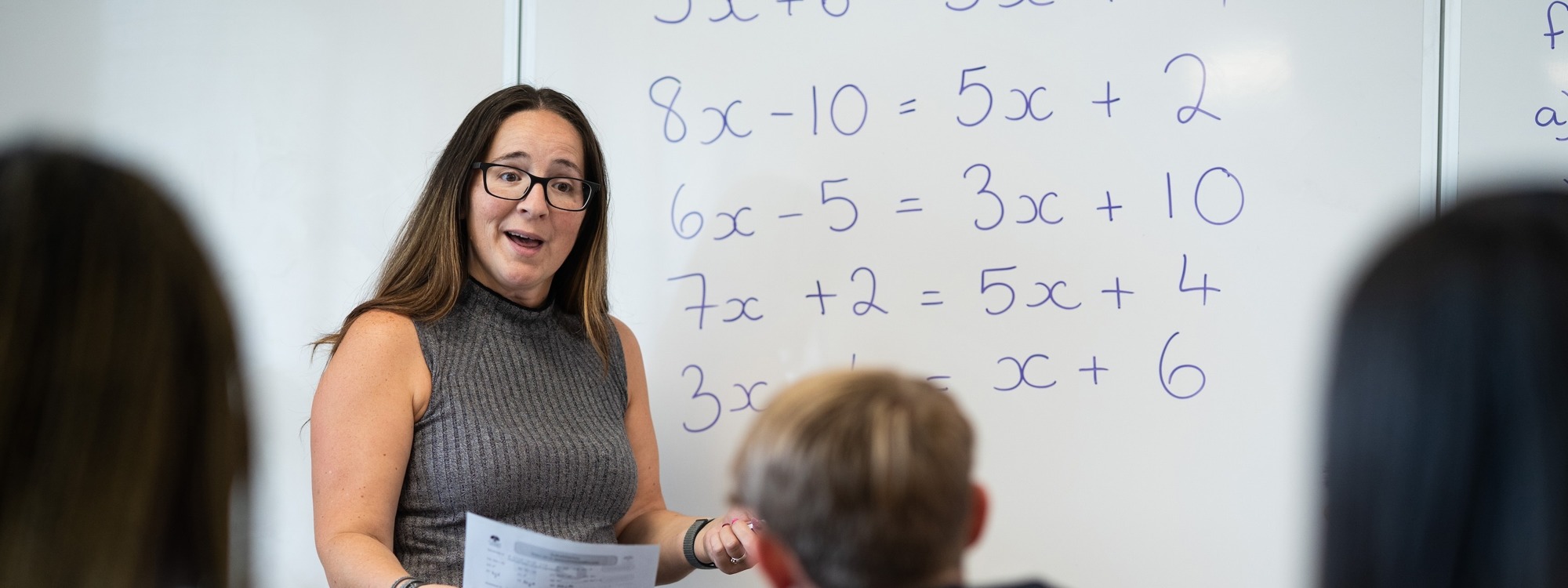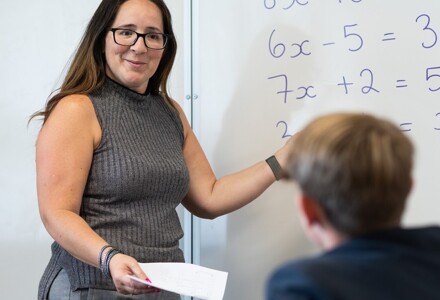Maths
Key Stage 3
Subject Introduction
Mathematics is a subject that continually builds on key ideas. Through studying topics in more complexity, it enables students to have a greater understanding of the world around them. In Year 7, mathematics students deepen their understanding of many familiar concepts and build on these within new topics. We provide opportunities for them to explore concepts in depth and link this learning to new ideas, particularly within algebra. The use of representations and manipulatives is key to this and algebra discs are often used to enable students to visualise complex abstract mathematical ideas. Students are supported at all levels of attainment and there are opportunities for challenge within every topic.
Modules
- Four operations
- Types of numbers
- Negative numbers
- Algebraic notation
- Solving with negative numbers
- Sequences
- Equality and equivalence
- Place value and ordering
- Fractions, decimals and percentages
- Solving problems with four operations, including finance
- Fractions and percentages
- Fractions
- Constructing, measuring and geometric notation
- Developing geometric reasoning
Note: Students will study topics appropriate for their starting points. Previous learning may be retaught or revisited when gaps in learning, or misconceptions, are identified.
Assessment
Students complete regular assessments to check what they have learnt and what they still need to explore and practice.
They will have three formal assessments each year.
Homework
Homework is either paper based, or online on Sparx. Homework generally involves practicing topics they have already learnt, to support them in remembering the key concepts that they have covered in lessons.
Extension activities
Students can complete the additional optional homework on Sparx, which changes each week and is personalised to their learning. There is an XP boost section, which is more practice on the topics in their compulsory homework. There is also a target section, which is slightly harder topics which is a great way for students to challenge themselves in their learning.
Subject Introduction
Mathematics is a subject that continually builds on key ideas. Through studying topics in more complexity, it enables students to have a greater understanding of the world around them. In Year 8, mathematics students deepen their understanding of many of the concepts studied in Year 7 and build on these with new ideas, particularly within algebra. Students are supported at all levels of attainment and there are opportunities for challenge within every topic.
Modules
- Probability
- Prime numbers and proof
- Ratio and scale
- Multiplicative Change
- Multiplying and dividing fractions
- Working in the cartesian plane
- Representing data
- Tables and probability
- Brackets, equations and inequalities
- Sequences
- Indices
- Fractions and percentages
- Standard Form
- Area
Note: Students will study topics appropriate for their starting points. Previous learning may be retaught or revisited when gaps in learning, or misconceptions, are identified.
Assessment
Students complete regular assessments to check what they have learnt and what they still need to explore and practice.
They will have three formal assessments each year.
Homework
Homework is either paper based, or online on Sparx. Homework generally involves practicing topics they have already learnt, to support them in remembering the key concepts that they have covered in lessons.
Extension activities
Students can complete the additional optional homework on Sparx, which changes each week and is personalised to their learning. There is an XP boost section, which is more practice on the topics in their compulsory homework. There is also a target section, which is slightly harder topics which is a great way for students to challenge themselves in their learning.
Subject Introduction
Mathematics is a subject that continually builds on key ideas. Through studying topics in more complexity, it enables students to have a greater understanding of the world around them. In Year 9 mathematics students deepen their understanding of concepts studied in previous years and build on these within new topics. We begin to provide opportunities for students to experience the challenge of GCSE exam questions in order to help them explore concepts in greater depth. Students are supported at all levels of attainment and there are opportunities for challenge within every topic.
Modules
- Four operations
- Place value and rounding
- Powers and indices
- Prime factors and multiples
- Algebraic formulae, equations and substitution
- Expanding
- Factorising
- Graphs
- Fractions and percentages
- Ratio and proportion
- Inequalities notation
- Balancing equations and inequalities
- Sequences
- Angles
- Shape and Pythagoras
- Similarity
- Measures and trigonometry
- Perimeter, area and volume
- Standard form, error intervals and bounds
Note: students in Year 9 covered units on Britain, Europe, and the wider world in Year 8. This included a study of the persecution of Jews in Germany in the 1930s, and the Holocaust.
Assessment
Students complete regular assessments to check what they have learnt and what they still need to explore and practice.
They will have three formal assessments each year.
Homework
Homework is either paper based, or online on Sparx. Homework generally involves practicing topics they have already learnt, to support them in remembering the key concepts that they have covered in lessons.
Extension activities
Students can complete the additional optional homework on Sparx, which changes each week and is personalised to their learning. There is an XP boost section, which is more practice on the topics in their compulsory homework. There is also a target section, which is slightly harder topics which is a great way for students to challenge themselves in their learning.
Key Stage 4
Subject Introduction
Mathematics is a subject that continually builds on key ideas. Through studying topics in more complexity, it enables students to have a greater understanding of the world around them. In Year 10 mathematics students deepen their understanding of concepts studied in previous years and build on these within new topics. We provide opportunities for students to experience the challenge of GCSE exam questions in order to help them explore concepts in greater depth. Students are supported at all levels of attainment and there are opportunities for challenge within every topic.
Modules
- Ratio
- Proportion
- Standard form, error intervals and bounds
- Compound measures
- Percentages
- Algebra
- Similarity and congruence
- Trigonometry
- Length, area and volume
- Y = mx + c
- Transformations
- Data and averages
- Representing Data
- Probability and tree diagrams
- Venn diagrams
- Sine and Cosine Rule
- Distance/time/velocity graphs
- Simultaneous equations
- Quadratic Graphs
- Solving including inequalities
- Further graphs
- Circles and circle theorems
- Bearings
- Fractions
Note: Students will study topics appropriate for their starting points. Previous learning may be retaught or revisited when gaps in learning, or misconceptions, are identified.
Assessment
Students complete regular assessments to check what they have learnt and what they still need to explore and practice.
They will have three formal assessments each year.
Homework
Homework is either paper based, or online on Sparx. Homework generally involves practicing topics they have already learnt, to support them in remembering the key concepts that they have covered in lessons.
Extension activities
Students can complete the additional optional homework on Sparx, which changes each week and is personalised to their learning. There is an XP boost section, which is more practice on the topics in their compulsory homework. There is also a target section, which is slightly harder topics which is a great way for students to challenge themselves in their learning.
Subject Introduction
Mathematics is a subject that continually builds on key ideas. Through studying topics in more complexity, it enables students to have a greater understanding of the world around them. In Year 11 mathematics students deepen their understanding of concepts studied in previous years and build on these within new topics. We provide many opportunities for students to experience the challenge of GCSE exam questions in order to help them explore concepts in greater depth. Students are supported at all levels of attainment and there are opportunities for challenge within every topic. Concepts covered may vary depending on the tier of GCSE the students are sitting.
Modules
- Standard form and/or surds
- Rearranging equations
- Functions
- Inequalities
- Fraction, decimal and percentage conversions
- Linear and quadratic functions
- Angles
- Trigonometry
- Vectors
- Algebraic fractions
- Proof
- Algebraic graphs
- Rates of change and kinematics
- Trigonometric graphs
- Graph transformations
- Iteration
- Constructions and loci
Revisiting previous learning and consolidating key skills will take place continually throughout the year.
Assessment
Students complete regular assessments to check what they have learnt and what they still need to explore and practice.
They will have two formal mock exam assessments.
Homework
Homework is either paper based, or online on Sparx. Homework generally involves practicing topics they have already learnt, to support them in remembering the key concepts that they have covered in lessons.
Extension activities
Students can complete the additional optional homework on Sparx, which changes each week and is personalised to their learning. There is an XP boost section, which is more practice on the topics in their compulsory homework. There is also a target section, which is slightly harder topics which is a great way for students to challenge themselves in their learning.
Sixth Form
Core Maths at St Wilfrid’s (AQA 1350)
Subject Intent
Core Maths equips students who’ve passed GCSE Maths (grade 5+) with confidence in using maths in everyday and academic settings. It builds analytical thinking, data literacy, financial skills, and problem-solving—perfect for supporting subjects like science, geography, business, psychology or any pathway where maths matters.
Course Overview
Compulsory Topics
- Analysis of Data: Interpreting charts, statistics, averages
- Maths for Personal Finance: Budgeting, interest, tax, loans
- Estimation: Approximating in real contexts
- Critical Evaluation of Data and Models (spreadsheets, tables)
- Optional Topic 2A: Statistical Techniques: Normal distribution, probability, correlation & regression
Assessment
- Paper 1: Core Maths
- 1h 30m, 60 marks; covers compulsory topics with calculator allowed
- Paper 2: Pathway-specific
- 1h 30m, 60 marks; Statistical Techniques with calculator allowed
Both exams use preliminary material and formula sheets to focus on problem-solving rather than recall
Grading & Progression
- Graded A–E (unclassified if below E)
- Ideal as a companion to A-Level subjects with mathematical or statistical content—it’s valued by universities and employers.
Homework & Independent Study
- No independent study is set.
- All course content covered in 2 lessons per week in year 12.
- Year 13 is revision only, 2 lessons per week in the classroom.
Enrichment Opportunities
- Competitions or practical projects (e.g., fermi estimation problem solving)
- Supportive study sessions with peers to build real confidence with numbers
Where Can Core Maths Take You?
This qualification offers UCAS points (AS level) and robust maths without the full A-Level. It supports fields like economics, psychology, social sciences, natural sciences, finance, business, and beyond—especially where maths is used practically. Universities can make reduced offers.
A-Level Mathematics at St Wilfrid’s (AQA 7357)
Subject Intent
A-Level Maths is about seeing the world in patterns, structures, and logic. It builds the ability to solve problems, think clearly, and work with confidence under pressure. From algebra and calculus to statistics and mechanics, this course equips students with powerful tools for a wide range of careers and degrees.
We aim to help students enjoy the challenge of mathematics, develop resilience and precision, and apply mathematical thinking to real-life contexts in science, economics, computing, and beyond.
Course Overview
Year 12
- Pure Mathematics – algebra, coordinate geometry, surds, quadratics, trigonometry, exponentials and logarithms, calculus (differentiation), functions
- Statistics – data representation, probability, statistical distributions (including binomial and normal), hypothesis testing
- Mechanics – kinematics, forces, Newton’s laws, motion under gravity
Year 13
- Pure Mathematics – calculus (integration), vectors, sequences, numerical methods
- Further Statistics & Mechanics – extension of AS content, deeper modelling and problem solving
- Problem Solving & Proof – mathematical argument and formal reasoning integrated throughout
Assessment
- Paper 1: Pure Maths
- 2h written exam
- 100 Marks
- 33.3%
- Paper 2: Pure + Applied (Mechanics)
- 2h written exam
- 100 Marks
- 33.3%
- Paper 3: Pure + Applied (Statistics)
- 2h written exam
- 100 Marks
- 33.3%
- All papers include a mix of short and extended response questions
- Calculators are allowed in all exams
- No coursework or internal assessment
Homework & Independent Study
Students complete regular problem sets, past paper practice, and topic reviews.
Independent study includes revision using textbook and online resources (e.g. Integral, DrFrost, ExamQ), reviewing worked examples, and creating revision notes or question banks.
Enrichment Opportunities
- Senior Maths Challenge and team competitions
- Weekly support and revision workshops
- Stretch and challenge tasks for aspiring Oxbridge or STEM university applicants
- Guest lectures from university departments or STEM professionals
- Problem-solving clubs and national maths events
Where Can Mathematics Take You?
Mathematics is one of the most respected and versatile A-Levels, valued by universities and employers across all fields. It opens doors to:
University courses in:
- Mathematics, Engineering, Physics, Computer Science, Economics, Finance, Psychology, Architecture, Data Science
Careers in:
- Finance, Teaching, Data Analysis, Software Development, Civil Engineering, Scientific Research, Artificial Intelligence, Medicine (especially where logical reasoning is key)
Whether you're heading into a STEM degree or want to strengthen your reasoning and number skills for a broader field, A-Level Maths gives you a rock-solid foundation.
A-Level Further Mathematics at St Wilfrid’s (AQA 7367)
Subject Intent
Further Maths is for students who love a challenge. It deepens understanding of core mathematical ideas and introduces exciting new areas—like complex numbers, matrices, and differential equations. This course prepares students for competitive university courses in maths, physics, engineering, and economics, and develops confidence in abstract thinking, logical reasoning, and problem-solving.
Course Overview
Students take A-Level Maths alongside Further Maths. You’ll build on A-Level content and explore three areas:
Core Pure Mathematics
- Complex numbers
- Matrices
- Proof by induction
- Polar coordinates
- Further sequences and series
- Hyperbolic functions
- Further vectors
- Further integration
- Differential equations
- Numerical methods
Mechanics
- Centres of mass
- Forces and energy
- Momentum
- Circular motion
Discrete Mathematics
- Graph theory
- Networks
- Critical path analysis
- Linear programming
- Group theory
Assessment Overview
All papers are calculator-allowed. Questions include structured, multi-step problems requiring high-level mathematical thinking.
- Paper 1 - Pure Mathematics
- 2 hours
- 100 Marks
- 33⅓%
- Paper 2 - Pure Mathematics
- 2 hours
- 33⅓%
- Paper 3 - Mechanics and Discrete
- 2 hours
- 33⅓%
Homework & Independent Study
- Regular problem-solving tasks and past paper practice
- Review of example problems and teacher-led model solutions
- Exploration of extension topics and university-level questions
- Independent research for deeper mathematical insight
Enrichment Opportunities
- UKMT Senior Maths Challenge and Olympiad preparation
- Trips to university taster lectures or outreach events
- Extension classes for STEP, MAT or TMUA entrance exams
- Access to mathematical journals, puzzles, and careers workshops
Where Can Further Maths Take You?
Further Maths is highly regarded for courses in:
- Mathematics, Physics, Engineering, Economics, Computer Science
- It’s recommended (or required) for many top universities in STEM fields
- It also opens doors to careers in data science, software development, finance, research, teaching, and more.



